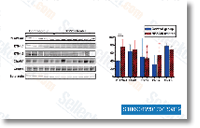AG1024 therapy is reported to lower the expression of a few proteins often called regula tors of apoptosis and the cell cycle, as well as inhibitor could thus also give a longer term inhibitory result by mechanisms involving protein degradation. A significant point, illustrated in Fig. five, is overexpression from the IGF 1 receptor effects in increased resistance to gefit inib. This observation implies that one particular way during which breast can cer cells resist gefitinib is through the signaling action of IGF 1R. Considering that gefitinib does not influence phosphorylation of the IGF one receptor, our effects suggest the antia poptotic pathways driven by IGF 1 signalling should really be targeted to be able to optimize the antineoplastic effects of gefit inib.
When our model system includes elevated IGF 1R activ ity as a result of receptor overexpression, it have to be mentioned that increased IGF 1R signaling in clinical breast cancer may additionally arise from mechanisms involving abnormally large IGF two expression or from derangements selleck chemicals in IGF binding protein phys iology. The findings described right here recommend that the antineoplastic effects of gefitinib could possibly be substantially underestimated if examination ined only beneath conditions by which IGF IR is completely functional. Numerous anti IGF 1R compounds are now remaining formulated for clinical evaluation, and it should quickly be possible to perform trials to test the hypothesis that the efficacy of gefit inib remedies is enhanced by IGF 1R targeting. The information pre sented right here help more study into breast cancer therapeutic methods combining gefitinib with anti IGF 1R agents.
Conclusion In various human breast cancer cell lines, addition OC000459 concentration from the IGF 1R inhibitor AG1024 to gefitinib decreased cell proliferation in an additive or synergistic trend and enhanced the induction of apoptosis more than levels accomplished by gefitinib alone. This result was independent of amounts of expression in the EGF receptor. Overexpression of IGF 1R in SK BR three cells was ample to result in a marked enhancement in gefitinib resistance. IGF 1R signaling can hence limit the antiproliferative results of gefitinib in vitro, and we speculate that for a subset of human breast cancers, including an anti IGF 1R strategy to gefitinib therapy might be additional efficient than just one agent method. Introduction The anaphase marketing complicated is definitely an E3 ubiquitin ligase that controls mitotic progression.
APC is known as a pol ymeric protein complex composed of at the very least eleven subunits, which is made up of  tetratricopeptide repeat proteins, a cullin homolog, and also a ring H2 finger domain. APC demands two WD40 repeat contain ing coactivators, Cdc20 and Cdh1, to recruit and decide on many substrates at distinct phases within the cell cycle, and it was a short while ago recommended that APC3 and APC7 interact with these APC activators.
tetratricopeptide repeat proteins, a cullin homolog, and also a ring H2 finger domain. APC demands two WD40 repeat contain ing coactivators, Cdc20 and Cdh1, to recruit and decide on many substrates at distinct phases within the cell cycle, and it was a short while ago recommended that APC3 and APC7 interact with these APC activators.
PKA Signal
PKA signal is required for initiation
